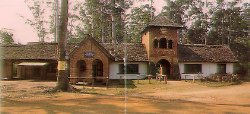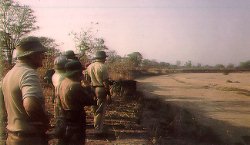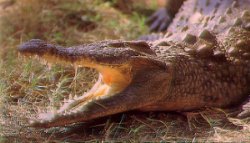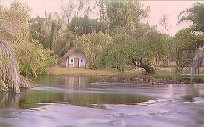

Three hundred years ago, the formidable Bemba people came down
from the Congo to occupy what is now the Northern Province of
Zambia. One of these Bemba clans was known as the "People
of the Royal Crocodile", or Beni Ngandu. This particular
clan was breaking new ground on the northern plateau when they
came across a dead crocodile, for them an excellent omen, and
they decided to settle by the lake, which became know as Shiwa
Ngandu, the Lake of Royal Crocodiles. It certainly was a good
omen, the Bena Ngandu flourished and to this day is a dominant
force in the Bemba chieftainship.
They had come to a country of woodlands and extensive forests, rivers marshes and rocky hills with a varied flora and fauna. Much later, on 15th January 1867, David Livingstone came upon the lake at Shiwa as part of his fruitless quest for the source of the Nile. When he left shortly afterwards, his search was no further forward and his dog, Chitane, had been eaten by one of the royal crocodiles. As if that were not enough, Livingstone also lost his medicine chest, which may well have contributed to his death as he was unable to treat his fevers with quinine.
It was the example of the
Livingstone and his seemingly endless travels that set another
young man, the 31-year old Stewart Gore Brown, known as "SGB",
on a trip to Shiwa. SGB was already a veteran of the Boer wars
and a veteran of the 1911 Boundary Commission that set the border
between Northern Rhodesia and the Belgian Congo. Like his hero,
he was exceptional man, and his dedication to doing his duty was
to be, was as strong as Livingtone's.

Part of Shiwa Village, inlcuding the Post Office and Workshops. ->
The 10th of April 1914 was Easter Day and, as Gore Browne reported: "We suddenly came upon what I thought was the most beautiful lake I had ever seen. It was surrounded by hilly country, and along its shores were groves of rare trees of a kind sacred to Africans. Friendly folk inhabited the one big village on the lakeshore and there were a dozen herds of different wild game. The surrounding land seemed to be reasonably fertile judging by the crops that were ripening there. I knew at once that I had found what I was looking for.";
For Gore Browne the die was now cast and he's et about acquiring the land, 10,000 acres, at two shillings (now 10p) an acre. His plans were ambitious, he intended to build a kind of English village in the heart of the inaccessible north plateau. such an undertaking would obviously take time and, unfortunately, he had accomplished very little when the First Worl War broke out. SGB immediately rejoined his regiment and served with distinction on the Western Front, first at the Retreat from Mons, where he was mentioned in dispatches and then at the Somme, where he was awarded the DSO.
It was not until six years later, in 1920, that he was able to
set about building his African dream. He did so with single minded
determination. He recruited local people and trained them as
builders, carpenters and blacksmiths, using local materials.
Together they built Shiwa House as the centerpiece of the state,
with its towers, arched terraces, sloping roofs and formal English
garden. Next came the houses for the estate workers. had been
employed on the job and they had built a hospital, schools, a
chapel, shops, a workshop and a post office. In fact, Shiwa Ngandu
today is rather better equipped than the average English village.

Walking safaris are a apeciality in Zambia allowing you to get a real feel for the country.
Like all strong, single-minded men, Gore Browne had a notably fiery temper, which caused the local Bemba to nickname him Chipembele (rhinoceros). But as his daughter, Lorna, explained to Micheal Palin (who stayed at Shiwa Ngandu during his Pole to Pole television series) "...a rhino charges and then actually stops and he was just like that... he would get very angry with you and then five minute later he would be asking you for a loan."
The returns from agriculture were disappointing and after some research in Bulgaria and many local trials, the estate was given over to the production of "essential oils", used in the preparation of perfume. The most lucrative and successful proved to be citrus trees. At one time the distilled essence fetched the same price as gold, at 7 pounds per ounce. Then at the height of success, in 1947, disaster struck. Trees imported from South Africa infected the other trees with tristisia and, within a couple of years, virtually all stock was dead. Farming and cattle ranching succeeded the essential oils, but the most successful money earner to date has been the tourist enterprise, Shiwa Safaris.
Despite his quickfire temper, SGB was not the archetypal colonialist, with racist undertones. Not at all, Gore Brown respected people for what they were rather than their colour. In 1935 he was elected to the Legislative Council and ten years later he was knighted. Nevertheless, he spoke out forcibly against the idiocies and inequities of the rule by Colonial Civil Servants. In 1956 he resigned from the Legislative Council and, in 1962, he joined Kenneth Kauda's United National Independence Party, but failed to be elected because he did not gain enough European votes. SGB died on the 4th August 1967, aged 84. He is buried on a hilltop overlooking his beloved lake, on the stone is engraved simply "Chipembele".
Whilst Gore Brown has been dead for 27 years, his spirit is still
felt in the great house he built, which is now open to guests
of Shiwa Safaris. You can take walking or boating excursions
and go to Nachipala Hill, where Dr. Livingstone took his mistaken
bearings; you can also visit the lake where the god doctor lost
his dog. Shiwa Safaris are one of only two operators in the North
Luangwa - a truly authentic wilderness area. The safaris are
personalised in the old style, as befits an enterprise directed
by Gore Brown's grandson, David Harvey.

Sacred crocodiles are just one of the many species to be found in the area around Shiwa Ngandu.
The North Luanga is an area of 4,636 sq. km bordered by the Muchinga
escarpment and the great Luangwa River. It is the home of 400
species of birds and a healthy population of elephant, lion, leopard,
buffalo, hippo and the antelope species. Accommodation is rugged
but comfortable, in Bemba style rondavels, with the addition of
hot showers. Without leaving the estate you could stay at Kapishya
Hot Springs, huts 20 km from Shiwa House, where the hot water
bubbles up through white sand, enabling you to take a soak in
the palm fringed spring. Chalets are of the traditional "pole
and dagga" type with en suite facilities, actually very comfortable.

Kapishya Hot Springs Camp where visitors can stay on the banks of Mansya River.
Shiwa Ngandu is the realisation of one, admittedly eccentric,
man's dream: the creation of a manor house in the heart of Africa.
It is right and proper that we shall never see its like again,
but it is a rich slice of Africa's history and also one of the
finest spots in Zambia.

 go back
go back